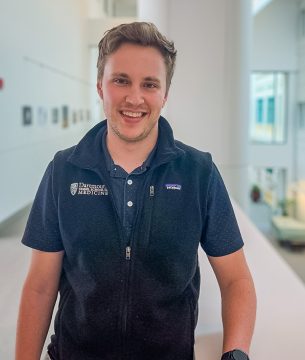Geisel medical student Drew Bergman ’24 is furthering his research interests with a newly published paper and a Radiological Society of North America Medical Student Research Grant.
Published today in Nature, “Compatibility rules of human enhancer and promoter sequences”, looks at gene regulation in the human genome controlled by distal enhancers that activate specific nearby promoters. One model for this specificity is that promoters might have sequence-encoded preferences for certain enhancers, for example mediated by interacting sets of transcription factors or cofactors. This biochemical compatibility model has been supported by observations at individual human promoters and by genome-wide measurements in Drosophila (fruit flies). However, the degree to which human enhancers and promoters are intrinsically compatible has not been systematically measured, and how their activities combine to control RNA expression remains unclear.

Lead author Bergman along with groups from Stanford University School of Medicine and the Broad Institute report that both human and mouse enhancers and promoters are broadly compatible.
This differs from what has been seen in previous experiments with Drosophila that found significant specificity between promoters and enhancers.
Bergman says the two findings seem at odds, but both can be true.
He notes, some groups of promoters and some groups of enhancers appear to show some bonus activation, or lower than expected activity, though both human and mouse promoters and enhancers are broadly compatible and there is significant specificity beyond that broad compatibility.
“Our findings suggest that in humans, enhancers regulate nearby genes mostly according to inherent enhancer and promoter strength,” Bergman says. “But there are sequence-specific features that lead to specificity. Understanding more about how DNA sequence controls both independent strength of promoters and enhancers, in the broadly compatible sense, as well as how they interact with some additional specificity will help us understand the mechanisms behind many genetic diseases.”
Bergman started this research project during his three years as a researcher at the Broad Institute and continued as Geisel’s 2021 Alpha Omega Alpha Carolyn L. Kuckein Student Research Fellow.
Looking ahead to his interest in radiation oncology, Bergman received a 2022 Radiological Society of North America Medical Student Research Grant that gives medical students an opportunity to gain research experience in academic radiology and radiation oncology while in medical school.
His project, “Epigenetic mechanisms of the FLASH radiotherapy effect,” will explore the molecular mechanisms behind a new and exciting technological advance in radiation therapy for cancer treatment, FLASH.
“FLASH is radiation delivered at very high rates that, for reasons yet unknown, greatly reduces the toxic side-effects of radiation while still being effective at killing tumor cells,” Bergman explains. “I’ll be joining an inter-departmental collaboration between the lab of Dr. Chun-Chieh (Paul) Lin in the Department of Pathology and Laboratory Medicine and Dr. Rongxiao Zhang in the Section of Radiation Oncology at Dartmouth Hitchcock Medical Center.
“This wouldn’t have been possible without the advocacy of Dr. Lin, Dr. Zhang, and especially Dr. Charles Thomas, Section Chief of Radiation Oncology,” he says. “This award will allow me to dedicate time to dive into more basic and translational cancer discovery during my third and fourth years at Geisel, something I aspire to continue during my career in medicine. I’m extremely grateful to receive the grant, which really is a testament to the support that Dartmouth Health and Geisel give to their students.”